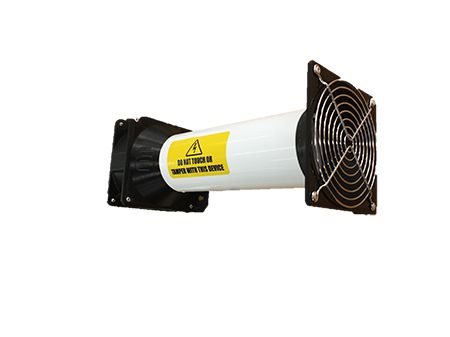
The result is a newly designed and updated ozone generator – which can be used to treat water and fresh produce can also disinfect areas and surfaces. This can have a meaningful impact in safeguarding public spaces such as universities, schools, hospitals, clinics, libraries and even public transport.
The new ozone generator design is inspired by an NWU patent. According to FR Bezuidenhout, commercialisation specialist of the NWU’s Technology Transfer and Innovation Support Office, the existing NWU patent for producing ozone is the original invention of Barend Visser, physics inventor in the Faculty of Natural and Agricultural Sciences. When compared to other products currently on the market, the technology is very economical.
The project is likely to have a long-term impact, says Dr Emile Kotzé, head of the Health Clinic on the Potchefstroom Campus, who is contributing health expertise to the ozone generator project. “The need for this equipment will not end with the pandemic but will continue for years to come as we will also have to address future health needs in South Africa. This is a good cost-effective and viable alternative for cleaning public surfaces, buildings and areas,” says Dr Kotzé, a medical doctor.
The ozone project is also valuable in research terms, he says. “We learn new information as we are working on the project. A lot of important research has already been done and new research will follow as we go along.”
At the beginning of the Covid-19 pandemic, the NWU assembled a team to investigate how to appropriate existing technologies towards solutions for the pandemic, according to FR. “We realised that Barend’s invention holds a lot of untapped potential. We believe that this exciting technology will also be used long after the pandemic in addressing other health challenges such as tuberculosis.”
The new ozone generator combines capable sensors with generation technology to create a smart sensing product that is able to automatically control the amount of ozone generated and deployed in a specific area, says FR. “We believe this could be a long-term cost-effective disinfection solution for all industries.”
The newly updated design is four times more effective in terms of ozone yield, he says. It can also be produced much more cost-effectively than the original version. “The team put a lot of work into updating and testing the ozone generator. It was a mammoth task that employed the expertise of various roleplayers, departments and faculties of the university. It was inspiring to see how everyone’s dedication contributed in realising the innovation and potential impact of the project.”
This truly multidisciplinary project involved many staff members and stakeholders, from the Technology Transfer and Innovation Support Office and the NWU Health Clinic to staff and students in computer and electronic engineering at the Faculty of Engineering, occupational health and safety experts from the Faculty of Health Sciences, the NWU’s financial staff and management across all the various testing sites.
The testing of an initial 10 ozone generator prototypes had already started in August 2020. These units were extensively tested in different-sized rooms to determine the amount of ozone they were able to emit.
FR says they have now produced an additional 200 demo units after concluding the testing of the prototypes. “Our goal is to place them within operational environments while at the same time continuing with the tests. We had to plan carefully as all tests have to be performed while there are no people present in the testing areas.”
The testing sites include the NWU Health Clinic and the Ferdinand Postma Library on the Potchefstroom Campus.
“The development is ongoing and we are currently investigating an even higher yield generator for which we have employed the talents and expertise of a final-year engineering student, Izak Adendorff, to design our very own sensor technology that will be able to measure ozone in real time.”
FR says when all testing is completed they aim to produce units for further deployment on the NWU’s campuses and thereafter go into full commercial production.